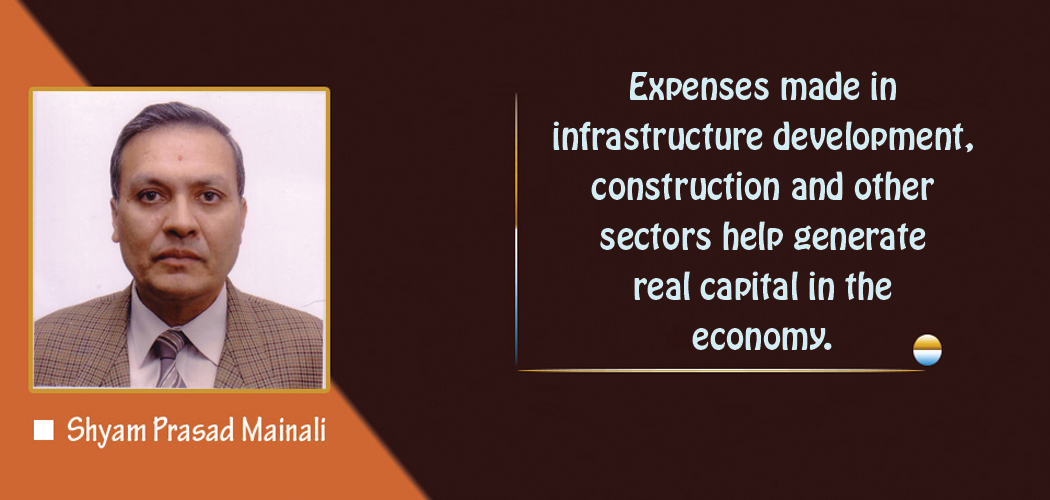- Saturday, 28 February 2026
Significance Of Timely Capital Spending
Shyam Prasad Mainali
Nepal’s annual budget has been facing numerous problems. For a few years, the budget has been superseding capital expenditure and the government has tried to promote capital formation. Despite public criticism and vows from the government to address this issue, the cycle continues. Capital expenditure is essential to expedite the quality and quantity of public service delivery. A large amount of such expenditure is concentrated on the investment of infrastructure, especially the transport, health, education, and research.
Such expenditure has the potential to positively impact economic growth and development. At a macro-level, it intends to uplift the national economy effectively. Sufficient attention is given to the prudent use of national resources. Nepal's capital expenditure is not consistent throughout the fiscal year as it remains sluggish initially and rapidly increases during the last quarter of the fiscal year just to meet targets. This raises questions pertaining to the overall effectiveness of services and quality of development outputs.
Binding constraint
Expenses made in infrastructure development, construction and other sectors help generate real capital in the economy. The capital budget includes funds allocated to execute civil works as well as purchase land, buildings, plants, and machinery. Low capital spending creates a binding constraint on economic growth and delays the improvement of people's living standard.
A successful execution of budget depends on an efficient and effective use of capital expenditure. It is an important tool to address the rising expectations of people at large. Capital expenditure creates a congenial environment by generating jobs, ensuring liquidity in the banking sector.
In principally, the size of a recurrent budget if compared with a capital one should be substantially small. In contrast, recurrent expenses account for a large proportion of every annual budget in Nepal. Capital expenditure itself determines the economic growth rate of any nation.
If the annual budget is determined to escalate a high economic growth rate, it is essential to reduce the growing burden of recurrent expenses and divert the remaining funds to development purposes. The inability of the state to use funds has its reasons. In 2018-19, about 73.4 per cent of development budget was spent. At the outset of the fiscal year, a nominal amount of capital expenditure was spent which stood at only 5.5 per cent in the first quarter. It escalated to 17.68 per cent within the first half of the fiscal year.
Most amounts were spent at the end of the financial year. About 16.4 per cent was spent in the last week of the fiscal year. Economists say that at least 8-12 per cent of its gross domestic income needs to be spent on construction of public infrastructure.
The government is playing a leading role even in creating investment opportunities in infrastructure as well as public utility goods. Such a situation creates insufficient capital expenditure which results in a slow-paced development.
The eleventh hour exhaustion of capital budget also leads to short-lived roads, bridges, and other infrastructure wasting the state's resources.
The slow spending of capital is regarded as the main reason for low circulation of liquidity in the market. Banking transactions are negatively affected. Timely spending helps circulate cash in banks. The large amount of loanable funds in the financial sector over the past few years was an outcome of an inadequate and excessively slow pace of capital spending.
Due to the insufficient capacity of the line agencies, the development budget freezes at the end of the fiscal year. Delay in awarding contracts is another cause of slow or no spending of budget. Frequent transfers of personnel without sufficient reasons also impede capital spending.
Way forward
It is essential to make results-based performance evaluation of the concerned personnel. The policy of the government to set up a system of performance contracts needs to be effectively implemented. Obsolete structures of federalism need to be reviewed.
It is also necessary to make amendments to the Public Procurement Act and deal with other concerns stipulating a clear-cut business plan for the whole fiscal year. Line agencies must formulate a procurement plan for all projects on time. Vigorous training regarding the jurisdiction of the federal structure as well as the procedural manner to all elected representatives and concerned personnel should be provided.
Practices of pouring funds into multiple projects need to be discouraged. Emphasis should be given to identifying the priority of the project. Institutional capacity development and making the machinery efficient is a must. Special training programmes should be launched for the concerned to prepare procurement plans, as well as tender documents, which are among the measures that the government must adopt. Such productive efforts allow for reasonable capital spending right from the first quarter of the fiscal year.
(Mainali is a former government secretary.)
How did you feel after reading this news?
















